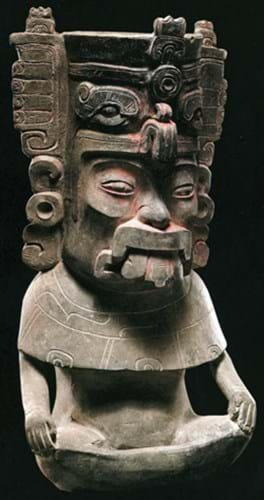
France's Office Central de la Lutte Contre le Trafic des Biens Culturels (bureau to combat the trafficking of cultural goods - OCBC) descended on the Drouot Montaigne sale venue at ten o'clock on the morning of the auction, after the Mexican Embassy obtained a court order the previous evening suspending the sale of 85 lots which they claimed had been illegally exported from Mexican territory.
Auctioneer Jean-Claude Binoche called the court-order "ludicrous" and accused the Embassy of bad faith, given that virtually all the works came from three "well-known private collections with fully documented provenance": two from America, the third that of famed French tribal art connoisseur Jacques Kerchache (1942-2001), advisor to the Quai Branly museum and close friend of ex-President Jacques Chirac.
The sale was organised jointly by two firms, Binoche-Renaud-Giguello (139 lots) and Pierre Bergé & Associés (eight lots), and presented by Paris-based Pre-Colombian expert Jacques Blazy - who insists that the OCBC was fully aware of the sale and its contents, and had approved all the documentation on provenance, which he had submitted to them weeks before the sale.
He also said that the Mexican Embassy had received the sale catalogues by registered mail at the end of July, and that the Ambassador had been invited to view the objects privately but had refused - verbally accusing him of selling works of "criminal origin".
Rather than recovering the items for Mexico, suggested Blazy, the Ambassador was interested only in spoiling the sale - an attitude he called "terrorism", whose end result would be to encourage pillaging and send the market underground.
Such was the hasty and indiscriminate nature of Mexico's intervention, says Blazy, that some of the lots impounded were not even Mexican, including a Mayan vase from Guatemala (estimate €150,000-200,000) and a terracotta female figure from Honduras (estimate €100,000-120,000).
This is the latest in a series of attempts by Latin American countries, acting through their embassies, to prevent pre-Colombian sales in Paris by claiming title to works originating from within their current borders.
As a result, Christie's have discontinued pre-Colombian sales in the city, even though Paris is considered the world capital of the tribal art market.
Indeed, the Binoche-Bergé sale was scheduled to overlap with the Parcours des Mondes gallery trail which attracts top international collectors to Paris each September.
The impounded lots will now be kept under seal at the auctioneers' premises pending a judicial inquiry, which could take several months. Binoche is confident that his (and PBA's) right to sell them will be upheld, and hopes to re-offer them for sale early in 2009.
Meanwhile, 62 lots from countries other than Mexico, and not affected by the court order, were finally offered on September 12. Of these 43 sold for a hammer total of €550,000, led by two Taino curved wooden spatulas (Santo Domingo, c.1000-1500 AD), each topped by a carved Zemi figure.
One, 17in (42cm) long, with a Zemi in acrobatic posture, fetched €117,000 (£92,860); the other, with a squatting Zemi figure, and slightly longer at 20in (52cm), for €87,000 (£69,000). Both were pre-empted by the French State for the Musée du Quai Branly, which prompted a wry chuckle from auctioneer Binoche.
"On the one hand, you have a State trying to block the sale," he noted, "but on the other, you have a State keen to acquire works from it!"
By Simon Hewitt




